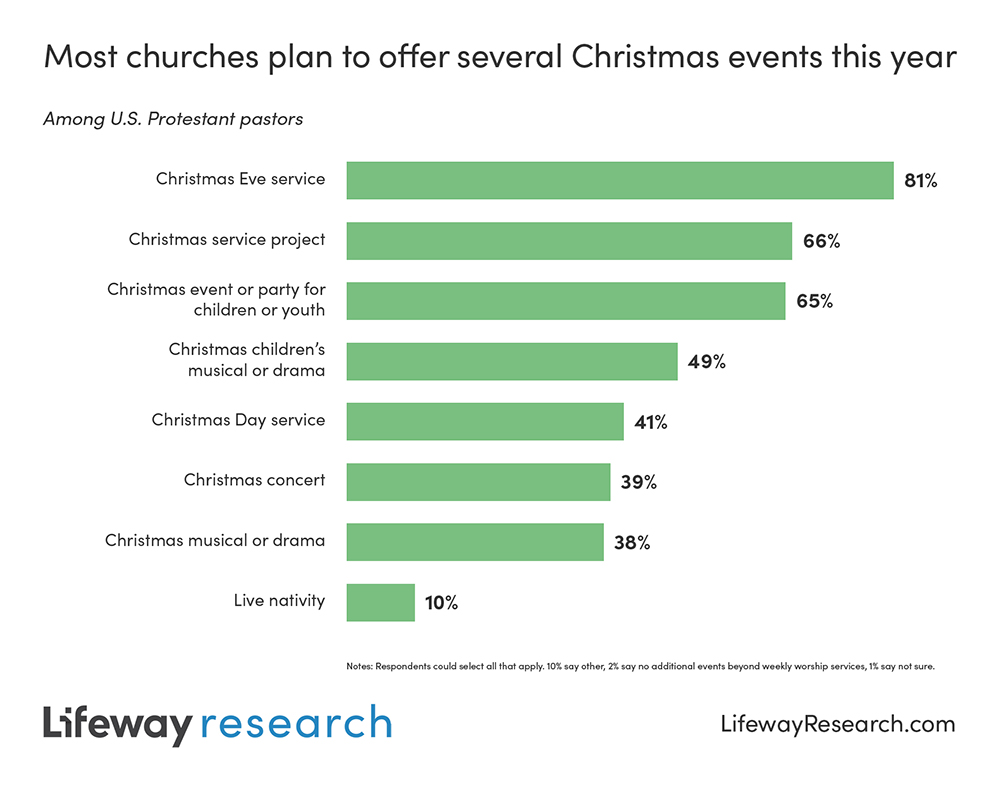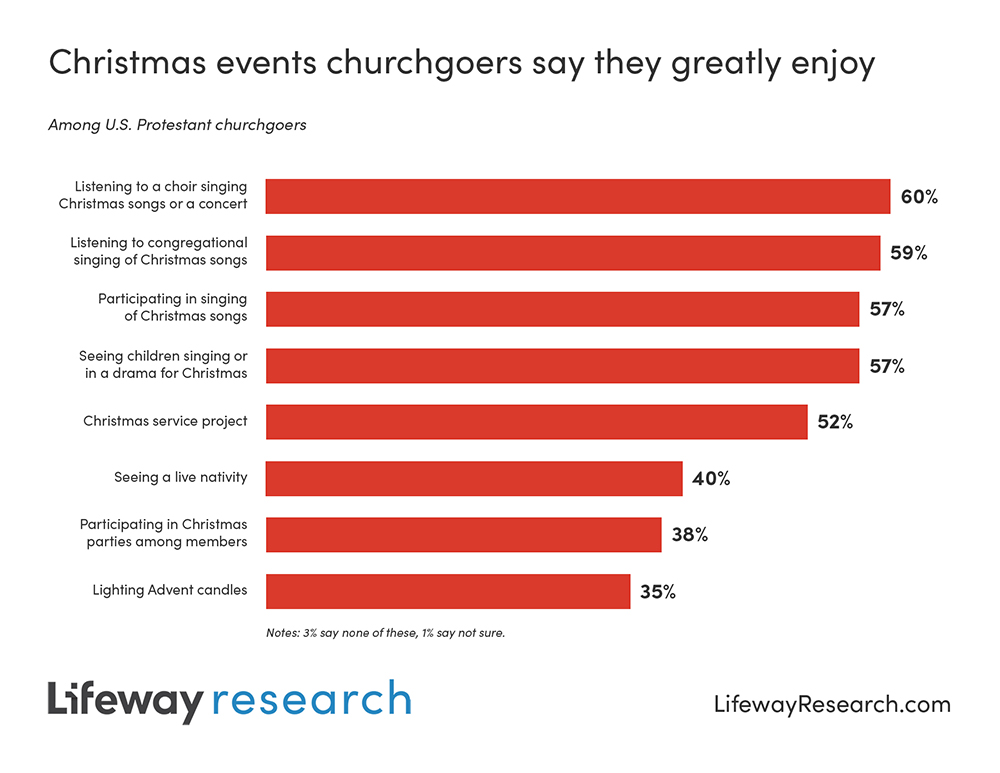BRENTWOOD, Tenn.—Churches this year are planning an average of four extra events or activities to help members and guests celebrate Christmas this year, Lifeway Research discovered.
A Christmas Eve service tops the list, with 4 in 5 pastors (81 percent) saying their churches plan to offer such a service this year in addition to weekly worship services.
Most churches also are planning to offer a Christmas service project (66 percent) and a Christmas event or party for children or youth (65 percent).
Half of pastors said their congregation plans to have a Christmas children’s musical or drama (49 percent). Around 2 in 5 plan on having a Christmas Day service (41 percent), Christmas concert (39 percent) or Christmas musical or drama (38 percent).
Another 1 in 10 say they are planning to offer a live nativity (10 percent) or planning something else (10 percent).
Few say they do not plan to have any additional events beyond weekly worship services (2 percent) or aren’t sure (1 percent).
“In recent years many churches have trimmed the number of programs they have during the week. But Christmas celebrations still fill the calendar for the typical church,” said Scott McConnell, executive director of Lifeway Research.
“Most churches plan Christmas events for all ages and create experiences that go beyond worship services.”
What do churchgoers want for Christmas?
Churchgoers say they enjoy going to an average of four church-led Christmas events from a list of potential events. Most say they greatly enjoy listening to a choir singing Christmas songs or a concert (60 percent), listening to congregational singing of Christmas songs (59 percent), participating in singing Christmas songs (57 percent), seeing children singing or in a drama for Christmas (57 percent) or participating in a Christmas service project (52 percent).
Sign up for our weekly edition and get all our headlines in your inbox on Thursdays
Two in 5 churchgoers say they greatly enjoy seeing a live nativity (40 percent) and participating in Christmas parties among members (38 percent).
Another 35 percent say they enjoy lighting Advent candles, while 3 percent don’t greatly enjoy any of these things, and 1 percent aren’t sure.
“Some churchgoers may attend a church that doesn’t offer Christmas events they have enjoyed a lot in the past,” McConnell said. “So, they may participate in activities at neighboring churches as they celebrate Christmas.”
Demographic differences noted
The smallest churches, those with fewer than 50 in attendance, are least likely to say they are offering a Christmas concert (27 percent), a musical or drama (28 percent), a children’s musical or drama (31 percent), a Christmas event or party for youth or children (46 percent) or a Christmas service project (56 percent).
Churches established prior to 1900 are more likely than the newest churches, those started between 2000 and 2023, to have a Christmas concert (42 percent v. 29 percent). Churches started before 1900 (74 percent) and between 1900 and 1949 (68 percent) are more likely than those at the newest churches (53 percent) to offer a Christmas service project. Churches birthed prior to 1990 also are most likely to plan a Christmas Eve service (89 percent).
The oldest pastors, those 65 and older, are the least likely to say their church is planning a Christmas event or party for children or youth (55 percent) or a Christmas Eve service (74 percent).
“The smallest churches are much less likely to offer Christmas activities that require a lot of people to produce because they just don’t have those people,” McConnell said. “But small churches are just as likely as larger ones to offer a Christmas Eve or Christmas Day service.”
Denominationally, Methodist pastors are the most likely to say they are planning a Christmas concert (53 percent). Lutheran pastors are the most likely to say they will offer a children’s musical or drama (70 percent) and a Christmas Day service (71 percent). Restorationist movement churches are the least likely to offer a Christmas Eve service (52 percent).
While Hispanic pastors are among the most likely to say their church will offer a live nativity (21 percent), African American pastors are the least likely to say they will be having a Christmas Eve service (46 percent). And mainline pastors are more likely than evangelical pastors to say they are having a Christmas Day service (48 percent v. 41 percent).
Females are more likely than male churchgoers to say they enjoy singing Christmas songs (61 percent vs. 52 percent), listening to a choir singing Christmas songs or a concert (64 percent vs. 55 percent), seeing children singing or in a drama for Christmas (62 percent vs. 51 percent), lighting Advent candles (37 percent vs. 31 percent), participating in a Christmas service project (59 percent vs. 43 percent) and seeing a live nativity (46 percent vs. 32 percent).
Age matters
Churchgoers aged 50 to 64 (62 percent) and 65 and older (66 percent) are more likely than those 18 to 34 (45 percent) and 35 to 49 (43 percent) to say they greatly enjoy singing Christmas songs.
Similarly, the oldest churchgoers are the most likely and the youngest churchgoers are the least likely to say they enjoy listening to congregational Christmas singing (71 percent and 38 percent).
Churchgoers aged 50 to 64 (63 percent) and 65 and older (67 percent) are more likely than those 18 to 34 (50 percent) and 35 to 49 (50 percent) to say they greatly enjoy listening to a choir or concert.
And churchgoers aged 50 to 64 (63 percent) and 65 and older (61 percent) are more likely than those 18 to 34 (50 percent) and 35 to 49 (47 percent) to say they greatly enjoy seeing children singing or in a drama for Christmas.
However, the youngest adult churchgoers, those ages 18 to 34, are more likely than the oldest, those 65 and older, to enjoy participating in Christmas parties among members (45 percent vs. 33 percent).
“Much like some radio stations, many churches spend several weeks each year singing Christmas songs. But the enjoyment of these songs in churches is not uniform, with far fewer young adults enjoying this custom,” McConnell said.
Churchgoers who attend worship services at least four times a month are more likely than those who attend one to three times a month to say they greatly enjoy singing Christmas songs (62 percent vs. 50 percent) and listening to congregational singing of Christmas songs (63 percent vs. 54 percent).
Additionally, churchgoers with evangelical beliefs are more likely than those without to enjoy singing Christmas songs (62 percent vs. 51 percent), listening to congregational singing (65 percent vs. 53 percent), seeing children sing or perform a Christmas drama (63 percent vs. 51 percent), participating in service projects (56 percent vs. 47 percent) and seeing a live nativity (44 percent vs. 35 percent).
Meanwhile, those in the largest churches, 250 to 499 (59 percent) and 500 or more (59 percent) are more likely than those in the smallest churches, fewer than 50 (46 percent) and 50 to 99 (48 percent), to say they greatly enjoy participating in Christmas service projects.
Similarly, those attending churches with worship attendance of 250 to 499 (49 percent) are more likely than those with fewer than 50 (38 percent), 50 to 99 (37 percent) or 100 to 249 (39 percent) to say they enjoy live nativities.
The online survey of American Protestant churchgoers was conducted Sept. 19-29. Analysts used quotas and slight weights to balance gender, age, region, ethnicity, education and religion to reflect the population more accurately. The completed sample is 1,008 surveys, providing 95 percent confidence the sampling error from the panel does not exceed plus or minus 3.2 percent.
The phone survey of American Protestant pastors was conducted Aug. 29-Sept. 20. Responses were weighted by region and church size to reflect the population more accurately. The completed sample is 1,004 surveys, providing 95 percent confidence the sampling error from the panel does not exceed plus or minus 3.2 percent.















We seek to connect God’s story and God’s people around the world. To learn more about God’s story, click here.
Send comments and feedback to Eric Black, our editor. For comments to be published, please specify “letter to the editor.” Maximum length for publication is 300 words.